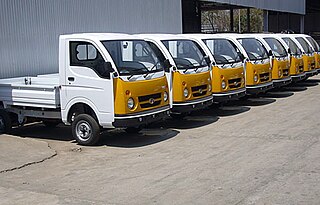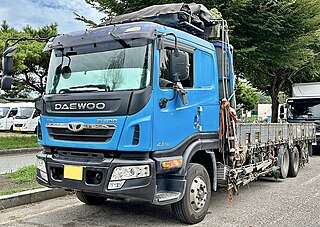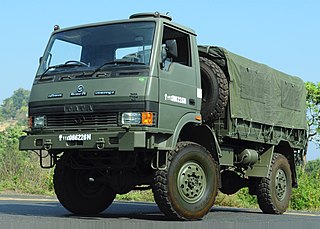
An auto rickshaw is a motorized version of the pulled rickshaw or cycle rickshaw. Most have three wheels and do not tilt. They are known by many terms in various countries including auto, auto rickshaw, baby taxi, mototaxi, pigeon, jonnybee, bajaj, chand gari, lapa, tuk-tuk, tum-tum, Keke-napep, Maruwa, Adaidaita Sahu, 3wheel, pragya, bao-bao, easy bike, CNG and tukxi.

Bajaj Auto Limited is an Indian multinational automotive manufacturing company based in Pune. It manufactures motorcycles, scooters and auto rickshaws. Bajaj Auto is a part of the Bajaj Group. It was founded by Jamnalal Bajaj (1889–1942) in Rajasthan in the 1940s.
Tata Motors Limited is an Indian Multinational automotive company, headquartered in Mumbai and part of the Tata Group. The company produces cars, trucks, vans, and busses.

Ashok Leyland is an Indian multinational automotive manufacturer, with its headquarters in Chennai. It is now owned by the Hinduja Group. It was founded in 1948 as Ashok Motors, which became Ashok Leyland in the year 1955 after collaboration with British Leyland. Ashok Leyland is the second largest manufacturer of commercial vehicles in India, the third largest manufacturer of buses in the world, and the tenth largest manufacturer of trucks.

The Tata Safari is a mid-size SUV produced by the Indian automobile manufacturer Tata Motors since 1998. The first-generation Safari has been designed as a seven-seater SUV with a foldable third row, roomy interior; on the market it has positioned itself as an alternative from the competitive price to other brands off-road vehicles.

The Toyota HiAce is a light commercial vehicle produced by the Japanese automobile manufacturer Toyota. First launched in October 1967, the HiAce has since been available in a wide range of body configurations, including a minivan/MPV, minibus, panel van, crew van, pickup truck, taxi and an ambulance.

The Tata Ace is a model of mini truck manufactured by Tata Motors that was launched in 2005.

The Daihatsu Hijet is a cab over microvan and kei truck produced and sold by the Japanese automaker Daihatsu since 1960. Despite the similarities between the Hijet name and Toyota's naming scheme for its trucks and vans, the name "Hijet" has been in use for Daihatsu's kei trucks and microvans since 1960, over two decades before Toyota took control. "Hijet", when transliterated into Japanese, is very similar to "Midget", one of Daihatsu's other mini-trucks. According to Daihatsu, the name "Hijet" was created to imply that the vehicle offers higher performance than the Midget. The Hijet competes in Japan with the Honda Acty, Mitsubishi Minicab, Nissan Clipper, Subaru Sambar and Suzuki Carry.
The automotive industry in India is the fourth-largest by production in the world as per 2022 statistics. As of 2023, India is the 3rd largest automobile market in the world in terms of sales. In 2022, India became the fourth largest country in the world by the valuation of its automotive industry.

The Auto Expo is a biennial automotive show held in Greater Noida, NCR, India.

The Piaggio Porter is a cab over microvan and pick-up produced and sold by the Italian company Piaggio since 1992 under the Piaggio Commercial Vehicle brand.

A kei truck, kei-class truck, or Japanese mini truck is a mini truck, a type of pickup truck available in rear-wheel drive or four-wheel drive versions, built to satisfy the Japanese keijidōsha statutory class. They are known as keitora in Japan alongside the microvan.

The automotive industry in Pakistan is one of the smallest but fastest-growing industries in the country, growing by 171% between 2014 and 2018. It accounts for 3% of Pakistan's GDP and employed a workforce of over 3.5 million people as of 2018. Pakistan is the 23rd largest producer of automobiles. Its contribution to the national exchequer is nearly Rs. 50-billion. Pakistan's auto market is among the smallest but fastest growing in Asia. 269,792 cars were sold in 2018, but this number declined to 186,716 in 2019 due to austerity measures. In the 1990s and early 2000s, Pakistan had many Japanese cars. With the launch of the first Auto Policy in 2005, Pakistan launched its first indigenous car, Adam Revo. However, after the 2008 elections, the dollar started depreciating, and due to bad governance, many automakers began to halt production, with some exiting Pakistan. Currently, the auto market is dominated by Honda, Toyota, and Suzuki. However, on 19 March 2016, Pakistan passed a second "Auto Policy 2016-21," which offers tax incentives to new automakers to establish manufacturing plants in the country. In response, Renault, Nissan, Proton Holdings, Kia, SsangYong, Volkswagen, FAW, and Hyundai have expressed interest in entering the Pakistani market. MG JW Automobile Pakistan has signed a memorandum of understanding (MoU) with Morris Garages (MG) Motor UK Limited, owned by SAIC Motor, to bring electric vehicles to Pakistan. NLC signed an agreement with Mercedes-Benz to manufacture Mercedes Actros trucks in Pakistan. Pakistan has not enforced any automotive safety standards or model upgrade policies. A few older vehicle models, including the Bolan and Ravi, continue to be sold by Suzuki. On 8 July 2021, Jolta Electric launched the production of electric motorcycles.

Tata Prima is a range of heavy trucks produced by Tata Motors, a wholly owned subsidiary of Tata & Sons of India. It was first introduced in 2008 as the company's 'global' truck. Tata Prima was the winner of the 'Commercial Vehicle of the Year' at the Apollo Commercial Vehicles Awards, 2010 and 2012. The 'HCV (Cargo) Truck of the Year, 2010' and the 'HCV (Rigid) Truck of the Year, 2012'. First truck range with Common rail engine, Automatic transmission, World-class cabin with HVAC, Air suspension driver seats, Data logger for performance tracking. The trucks have a combined loading capacity of 55 tonnes, ideal for heavy-duty shipment. The interior of the Prima is equipped with modern features like GPS, air conditioning, 4-way adjustable driver and co-driver seats, ADAS features like lane departure warning, driver eye monitoring system etc.

The Tata Aria is a full-size crossover SUV manufactured by Tata Motors of India. Tata Aria was launched on 5 January 2010 at Auto Expo, Delhi, and was launched to customers on 12 October 2010 and prices started at 10.4 lakhs INR Ex showroom or. It is based upon the Tata Xover concept showcased in the 2006 Geneva Motor Show. Tata Aria was also a series of concept cars introduced by Tata Motors at the Geneva Motor Show in 2000.

The Tata Magic is a four-row Microvan produced by the Indian automaker Tata Motors in 2007. It is a passenger variant of the Ace mini-truck and is marketed as an affordable commercial vehicle with low operating costs.

The Tata Magic Iris is a 3-door, 4- or 5-seater cabover microvan/minivan (MPV) manufactured by the Indian automaker Tata Motors. Powered by a 600cc one-cylinder diesel engine, it is intended to compete with auto-rickshaws.
With its engine delivering 11 hp (8 kW) and 31 Nm of torque, the vehicle has a top speed of just 34 mph (55 km/h).
In India the Small Commercial Vehicle (SCV) segment was created by the launch of Tata Ace in May 2005. This category can roughly be characterized as sub 1000cc engine and less than 3.5 tons of weight. This segment competes in the prevailing three-wheeler segment on the basis of cost, durability and new pollution control laws.

Tata Super Ace, launched by the Indian multinational automotive company Tata Motors Limited is a 1 tonne streamlined diesel mini truck. It offers a loading deck length of 2630 mm, a top speed of 125 km/h (78 mph), and a turning radius of 5.1 m. It is based on the design of the highly successful and acclaimed Tata Ace, India's first commercial sub one tonne four wheel mini truck, which also won the BBC Top Gear's Annual Best Commercial Vehicle Design Award, 2006.

The Tata LPTA is a military truck family developed and produced by Indian automobile manufacturer Tata Motors. The trucks are available in 4×4,6×6,8×8,10×10 and 12×12 configurations. With extreme off-road capabilities, they are proposed as replacement for Czech-designed Tatra trucks currently used by Indian armed forces.
















